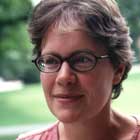Professor of English, Emerita
Contact
Education
Ph.D., B.A., University of Kent at Canterbury
About
Main Interests
First World War Literature and Culture; Modernism and modernity; Contemporary poetry; Feminist theory; History of Sexuality.
Other Interests
I am a member of the Steering Committee and membership secretary for the Society for the Space Between Society, which organizes an annual conference on literature and culture between 1949 and 1945, and publishes the Space Between journal. I am a Board member of the Rhode Island Women’s Fund.
I have chaired Wheaton’s Curriculum Evaluation Committee since 2002, and do consulting work on evaluation for English departments in Higher Education.
Publications
Books
The Bloomsbury Guide to Women’s Literature, editor, Bloomsbury Publishing and Prentice Hall, 1992
H.D. and Freud: Bisexuality and a Feminine Discourse, Harvester Wheatsheaf and St. Martin’s Press, 1991
Articles
Manuscript in preparation for circulation, “Unhoming Europe: Indian Sepoys on the Western Front in First World War Narratives.” In preparation.
“First World War English Elegy and the Disavowal of Women’s Sentimental Poetics” English Literature in Transition, 1880-1920, University of North Carolina, in press and forthcoming July 2010.
“Counter-Discursive Poetry of War,” The Cambridge Companion to Twentieth-Century British and Irish Women’s Poetry, ed. Jane Dowson Cambridge: Cambridge University Press, in press, forthcoming 2010
“J.R.R. Tolkien and his Twentieth Century Context” (3000 words); “J.R.R. Tolkien and War” (1500 words); “J.R.R. Tolkien and Sexuality” (1500 words), Michael Drout ed. Tolkien Encyclopedia New York: Routledge, 2006.
“British Women’s Writing of the Great War,” Cambridge Companion to the Literature of the First World War, ed. Vincent Sherry, Cambridge University Press, 2005.
“Introduction,” Janet Montefiore, Feminism and Poetry, Pandora Press, 2004
“This Other Eden”: Homoeroticism and Nationalism in the Early Poetry of H.D. and Radclyffe Hall, Women’s Experience of Modernity, 1875-1945, ed. Ann Ardis and Leslie Lewis, Johns Hopkins University Press, 2002.
“Engendering the Political: American Motherhood in the Writings of Lydia Sigourney,” Paragraph, Spring 1999
“Still Some Obstinate Emotion Remains”: Radclyffe Hall and the Meanings of Service,” Women’s Fiction and the First World War, ed. Suzanne Raitt and Trudi Tate, Oxford University Press, 1997
“Contemporary Women’s Poetry in the British Women’s Movement,” Contemporary British Poetry: Essays in Criticism, ed. James Acheson and Romana Huk, State University of New York Press, 1996
Teaching Interests
Modern British fiction; contemporary poetry; postcolonial literature and theory (special interests in Irish and Caribbean); literary and critical theory.
Student Projects
I have worked with numerous students on projects in the areas of Travel Writing, Contemporary Poetry, Caribbean Literature, Irish Literature, and the history of sexuality. To see my students work from English 343 Fictions of the Modern, take a look at the entry for Thomas Burke (author) in Wikipedia. The class joined forces to research Burke’s life and writing and collaborate on a new entry for Wikipedia.
Research Interests
My present research has taken shape from work I undertook for two articles on women’s writing and the 1914-1918 World War, one published and one in press. In the first article, “‘Still Some Obstinate Emotion Remains’: The Meanings of Service in the Fiction of Radclyffe Hall?” I examine the role of the Great War in the English writer Radclyffe Hall’s post-war attempts to connect lesbian sexuality to English patriotism. In the second, “‘This Other Eden’: Homoeroticism and the Great War in the Early Poetry of H.D. and Radclyffe Hall,” I compare the early poetry of Hall to that of the modernist American expatriate H.D., arguing that the war creates a new discursive context in which earlier paradigms for the literary representation of homosexuality and other dissident sexualities acquire new and contradictory meanings connected to nationalism.
My book, “Conceiving Strangeness: Spaces, Races, and Sexualities in English War Writing, 1914-1939” pursues my interest in the First World War and English national identity. My new focus is the relationship between travel writing and war writing.
